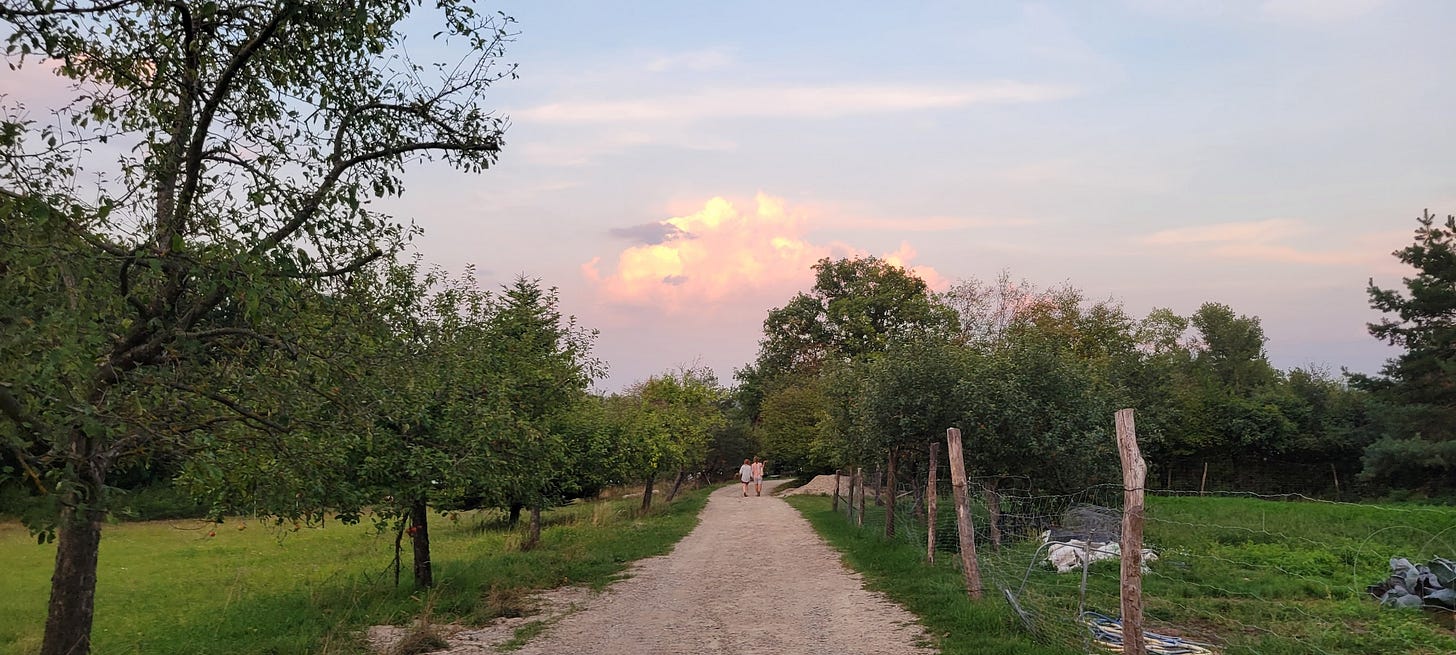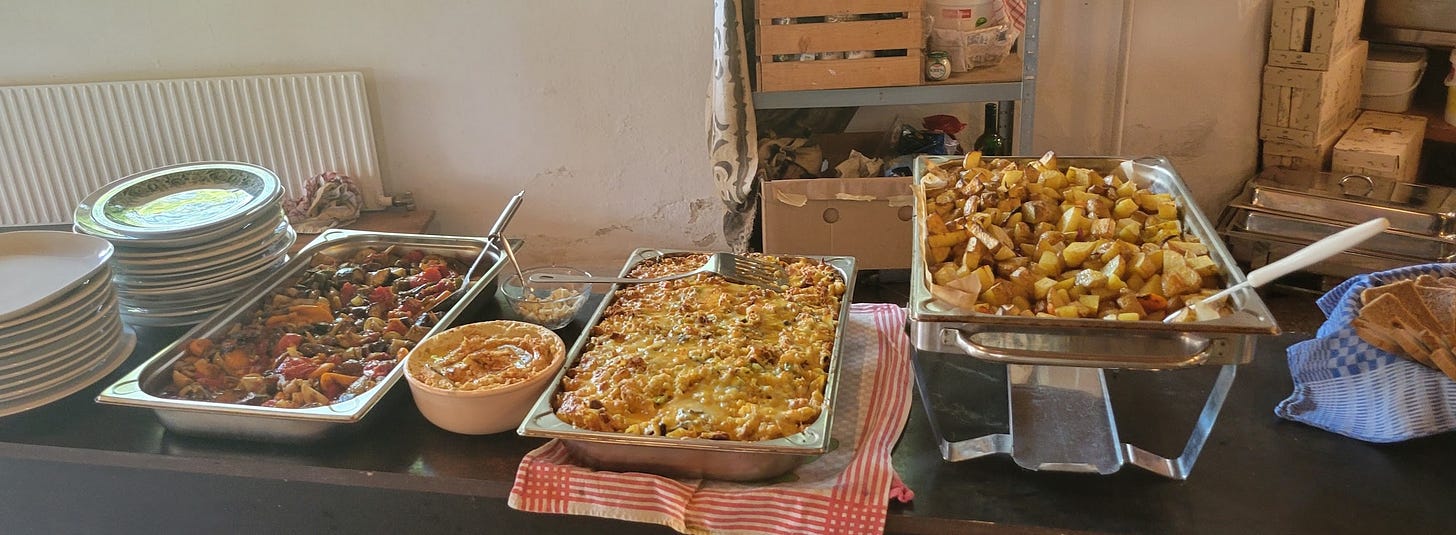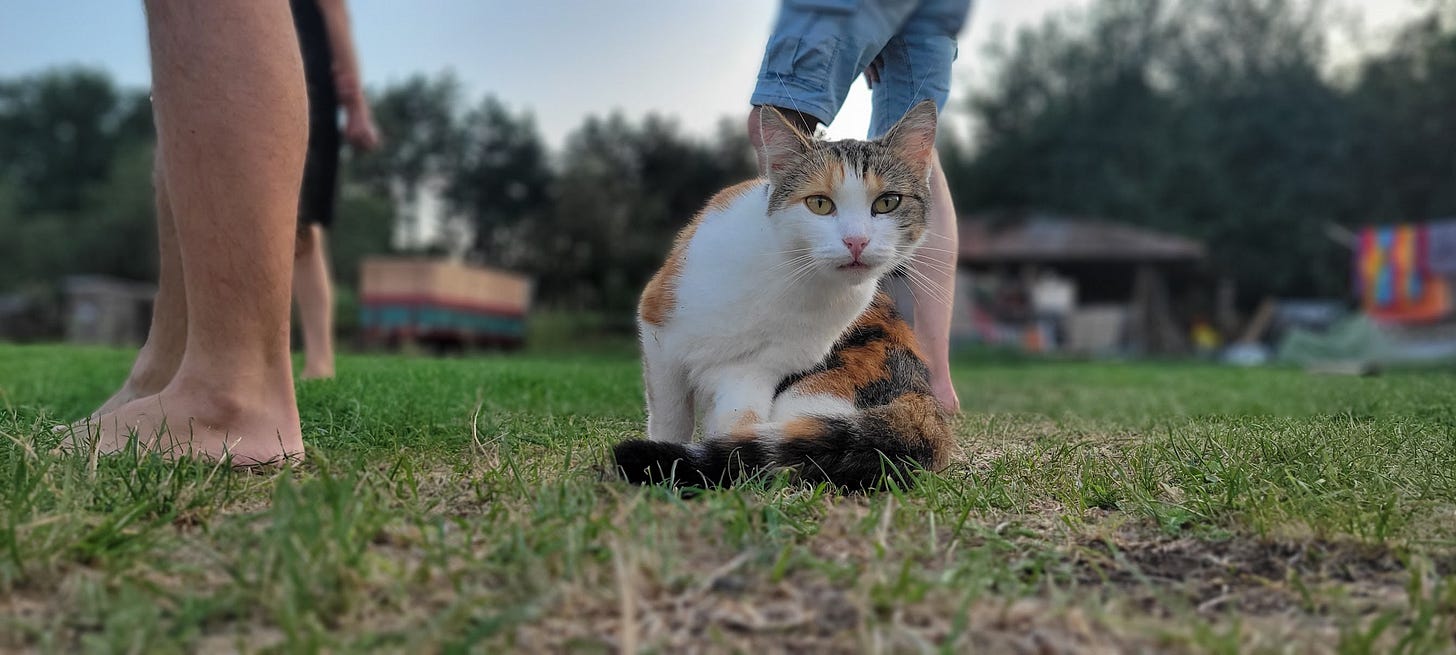This August the Microsolidarity Network had its third annual EU Summer Camp, with 52 people congregating at Kunst in der Natur (‘Art in Nature’), a spacious family-run campsite, artist retreat, and organic farm near Vienna, Austria.
Microsolidarity is a community building practice, aimed at fostering communities of belonging and purpose. The Micrsolidarity Network includes community-builders, facilitators, change-makers, and activists across the globe, with a red thread of people seeking greater connection and belonging. I joined the network in 2022 after practising Microsolidarity at a powerful residency on Embodying Collective Transformation, and then stepped forward to co-host this year’s EU Summer Camp.
The purpose of the Microsolidarity EU Summer Camp was to provide opportunity for members of the network and those curious about it to connect face-to-face, nerd out about community building, experiment and get a feel for practices and structures that build belonging, and provide peer-to-peer support. Having a damn good time doing it was also up there as a priority, hence summer camp vibes.
Here’s some of my key learnings from co-hosting this gathering:
Venue matters
Somewhat obvious, but worth stating. Venue has a huge role shaping the parameters of possibility and the vibes.
I recently spoke to participants from another camp who reflected on a widespread sense of disappointment by the end of their event. They attributed a significant part of this to the venue. Spread out, disjoined rooms without a centralised gathering space inhibited the flow of people, vibes and connection.
The Microsolidarity EU Summer Camp venue was a great fit for what we were trying to do. Kunst in der Natur is a large open meadow surrounded by acres of woods and art installations, with a big central point for congregating, sharing meals and hanging out.
We used Open Space Technology (a co-created agenda, whereby anyone who wants to can host a workshop, discussion, jam session etc.), with sessions taking place in informal, relaxed spots outdoors. We utilised the Open Space Law of Two Feet, inviting people to move on from a session if they weren’t so engaged, encouraging following aliveness and stimulating movement and cross-pollination of groups, ideas and energy. We saw sessions on music, mediation, meditation, peer-to-peer support, and socio-political change, alongside spontaneous breakouts of group singing, a drum and bass rave, and a whole lot more…
Workshops and offerings on our Open Space Technology board
2. Creating a Shared Container for the Gathering
We kicked off the gathering with a ceremony. The opening circle invited connection to individual and collective intention, and to one another and the place. This was followed by a Welcome Banquet.
The next day we got to business, introducing Open Space Technology and other camp structures and practices. To stimulate co-creation the hosting team introduced a Role Board where anyone could take on or create a role (we had a fabulous Breakfast Queen and Spiritual Librarian), and asked everyone to sign up to cooking and cleaning shifts.
Daily feasts created by the Cooking Crew with support from participants
Each day started with an Open Space Marketplace for pitching our respective sessions, followed by the open space sessions themselves, siesta, and pod meetings. Pods (also referred to as ‘crews’) are a core structure in Microsolidarity - they are groups of 3-6 people with a shared intention which meet regularly. They are a core feature of Microsolidarity gatherings - providing opportunity to connect with one another on a smaller scale, get support and sense-make about the event.
The opening - including the ceremony and introduction of camp practices and structures - set the stage for collective arrival, landing, and an emerging sense of camp norms and values and Who We Are as a group. Extra care is needed to weave in those who miss the opening.
Some participants expressed a wish for greater discussion and shared agreements on camp norms and behaviours. This leaves me curious to explore what might be the Microsolidarity way of building these norms. I’m also excited to experiment with holding space for dynamic discussion and agreement setting at the openings of my own events and gatherings.
Shoulder Tap High Context People
Half of participants were totally or partly new to Microsolidarity. We went some way to make visible those with higher levels of context of the network, knowledgeable about its history, norms and memes. High context members were, to some extent, encouraged to share their knowledge and experience of Microsolidarity. Yet we could have done this much more explicitly, better orientating the group with a deeper understanding of how we were collectively embodying Microsolidarity ways of doing and being, and what this afforded.
Pods combined people with higher and lower context of the network. Our assumption was that this would support osmosis of Microsolidarity norms and practices. It did to some extent. Yet high context folks didn’t necessarily know there was a leadership opportunity there for them to step into, to share their knowledge and experience of being in pods, and how to best utilise pod time; newbies didn’t necessarily know who to look to to orient themselves in the pods or at the gathering as a whole.
This should be explicit - publicly giving high context members the mandate for greater leadership, alongside more shoulder tapping, supporting them to step into a bigger role.
Richard Bartlett, founder of the Microsolidarity Network, talks about this further in the Retro with Camp Participants.
Embracing Another Damn Opportunity for Growth
Navigating interpersonal and group tension can be scary. I had a little wobble when some tension emerged and a part of myself that gets anxious around conflict - my ‘Firefighter Part’ - became activated, bringing an energy of high care, hyper-focus and seriousness. I received some feedback that this quality of attention felt very anchoring. And some other feedback that there was also space for a lighter presence and a more nuanced framing of the situation.
Interpersonal and group tension is inevitable and can be extremely generative. We come to Microsolidarity gatherings to experiment with doing things differently. We can practise being with and transforming tension on the small scale, to have the skills to do so on the larger scale.
With this in mind, next time, I'm bringing the same degree of care, alongside curiosity and the spirit of, ‘Friends, here we have another damn opportunity for growth, let’s Do the Thing…’
Mediation Skills are Queen
I experienced first hand the relief and beauty of being part of a well-resourced, skill-rich group of people. My good friends and conflict mediators Jocelyn Ames and Nicki Endres stepped in to gracefully host a 15+ person session exploring group tension. It was emotional, it was tense, it was messy, it was moving. By the end of the session we have moved to greater collective connection.
I’m feeling super pumped about mediation skills after being part of that process. Imagine loads of us able to step in, and offer space holding and conflict transformation skills for our friends, collaborators, and communities. I’ll be joining Jocelyn’s next mediation course. Join me!
Curious for more? Find out more about Microsolidarity; watch or listen to the Microsolidarity EU Summer Camp Hosting Crew Debrief, listen to the Retro with Camp Participants and Sharing of Camp Lessons Learnt with the Network.






Juicy reflections!! Loved reading :)